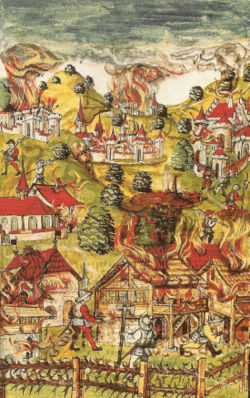Diebold Schilling the Younger
- Diebold Schilling the Younger
-

Illustration by Diebold Schilling the Younger: Scenes of looting and burning by the Swiss troops deployed in the "land of Vaud" (in
Luzerner Schilling)
Diebold Schilling the Younger (before 1460 - 3 November 1515(?)) was the author of the "Luzerner Schilling", one of the Swiss illustrated chronicles, which he presented to the city council of Lucerne on 15 January 1513 (but which remained incomplete). He was the nephew of Diebold Schilling the Elder of Berne. The younger Diebold was a somewhat scandalous figure, not unlike his father Hans, brother to the elder Diebold, an adventurer who had sought his fortune at the court of Matthias Corvinus, and returned destitute in 1488. Diebold was a secretary in Lucerne from 1479, and received the priesthood in 1481. His behaviour was so unpriestly, however, that the city council locked him into the tower in 1487, where he remained imprisoned for two years before he was released on parole of exhibiting more appropriate behaviour in the future. After his release he was soon back to his old ways, and after he had killed a man after a tavern brawl, he was fined and obliged to read a mass for his victim every year. Diebold was fiercely anti-French, and he accused the Bernese in particular, as well as his fellow chronicler Petermann Etterlin because of their friendly attitude towards France. Diebold's own sympathies lay with the German emperor Maximilian I, who personally invited him to the Reichstag in Konstanz in 1507. As an author, Diebold's most important contribution to the historiography of his times is his account of the years 1507–1509, the events of which he tells in his own words as an eye-witness.
References
External links
| Persondata |
| Name |
Schilling the Younger, Diebold |
| Alternative names |
|
| Short description |
|
| Date of birth |
|
| Place of birth |
|
| Date of death |
1515 |
| Place of death |
|
Categories:
- Chroniclers
- 1515 deaths
- 16th-century historians
- 16th-century Swiss people
- Swiss people stubs
- European writer stubs
Wikimedia Foundation.
2010.
Look at other dictionaries:
Diebold Schilling the Elder — The knight of Hohenberg and his servant executed in 1482 for sodomy Diebold Schilling the Elder (c. 1445 – 1485) was the author of several of the Swiss illustrated chronicles, the Berner Schilling of 1483, the Spiezer Schilling (1480s), and the… … Wikipedia
Schilling of Solothurn — The family of the two Swiss chroniclers called Diebold Schilling was originally from Solothurn. Klewi Schilling was a somewhat dubious character, and he was banned from the city, settling in Hagenau (Alsace), and probably died in Kaysersberg. His … Wikipedia
Luzerner Schilling — The Luzerner Schilling (or Luzernerchronik , Lucerne chronicle) is an illuminated manuscript of 1513, containing the chronicle of the history of the Swiss Confederation written by Diebold Schilling the Younger of Lucerne. The chronicle is an… … Wikipedia
Swiss illustrated chronicles — Several illustrated chronicles were created in the Old Swiss Confederacy in the 15th and 16th centuries. They were luxurious illuminated manuscripts produced for the urban elite of Berne and Lucerne, and their copious detailed illustrations allow … Wikipedia
Swiss literature — There is no such thing as a Swiss national vernacular literature, properly speaking. But there are four branches which make up a literature of Switzerland, according to the language in which the works are composed. As the Confederation, from its… … Wikipedia
Nicolás de Flüe — San Nicolás de Flüe Nicolás de Flüe, pieza del altar de la iglesia parroquial local en Sachseln. Hermano Klaus Nacimiento 21 de marzo de … Wikipedia Español
Stanser Verkommnis — Treaty of Stans Niklaus von Flüe counsels Heini Amgrund (top panel), which leads to a compromise resolution in Stans (bottom panel), illustration in the Luzerner Schilling of 1513 Type Eidgenossenschaft Signed … Wikipedia
1515 — Year 1515 (MDXV) was a common year starting on Monday (link will display the full calendar) of the Julian calendar. Events of 1515 January June * June Persia is invaded by Sultan Selim I of the Ottoman Empire. July December * September 5 Selim… … Wikipedia
Nicholas of Flüe — Saint Nicholas of Flüe Nicholas of Flüe, from the altar piece of the local parish church in Sachseln. Brother Klaus Born 1417 Unterwalden, Switzerland … Wikipedia
15. Januar — Der 15. Januar (in Österreich und Südtirol: 15. Jänner) ist der 15. Tag des Gregorianischen Kalenders, somit verbleiben noch 350 (in Schaltjahren 351) Tage bis zum Jahresende. Historische Jahrestage Dezember · Januar · Februar 1 … Deutsch Wikipedia

